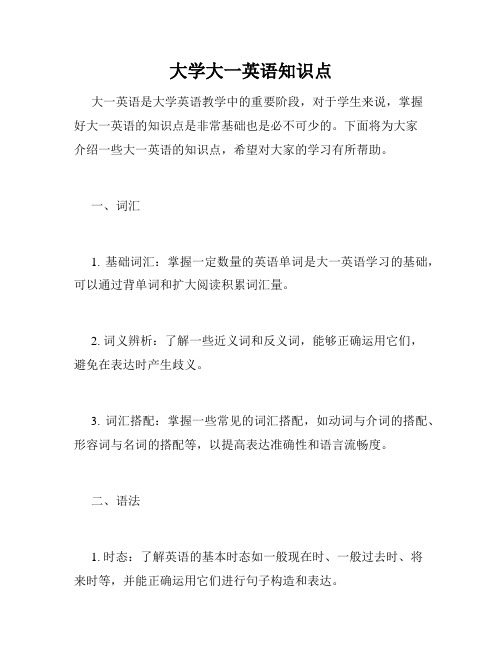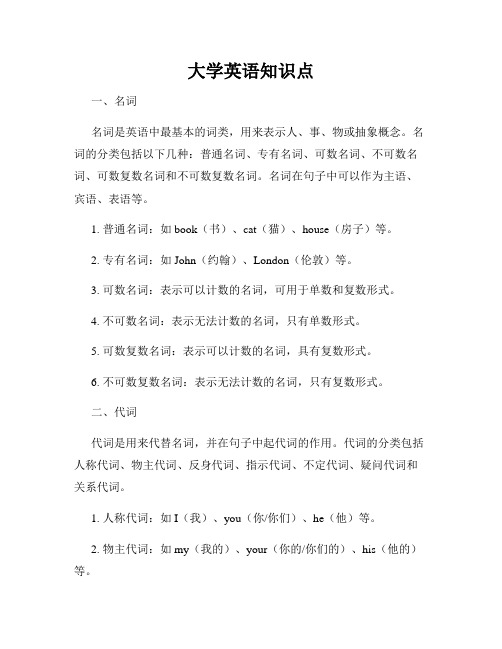大学英语知识点.
大学英语基础知识点大一

大学英语基础知识点大一大学英语对于大一新生来说是一个重要的学科,它涵盖了基本的英语语法、词汇、阅读、听力和写作技巧。
本文将介绍一些大学英语基础知识点,帮助大一新生更好地应对这门学科。
一、英语语法英语语法是英语学习的基础,以下是一些重要的语法知识点:1. 时态:英语有多种时态,如一般现在时、过去时、将来时等。
掌握各种时态的用法和构成对于正确运用英语至关重要。
2. 语态:英语有主动语态和被动语态两种形式。
学生需了解被动语态的构成和使用场景。
3. 从句:学习掌握名词性从句、定语从句和状语从句等不同类型的从句,并能正确使用它们。
二、英语词汇扩大词汇量是提高英语水平的关键。
以下是一些建议:1. 单词记忆:利用词卡、手机应用等工具,记忆常用单词的拼写、发音和意义。
2. 词根词缀:学习一些常用的词根和词缀,可以帮助理解和记忆更多的单词。
3. 同义词和反义词:了解词汇的近义词和反义词,可以帮助丰富表达方式。
三、英语阅读阅读是提高英语综合能力的重要途径。
以下是一些提高英语阅读能力的方法:1. 阅读量:多读英语文章,包括新闻、故事、杂志等。
逐渐提高阅读难度,培养阅读理解能力。
2. 阅读技巧:学习使用略读、扫读、精读等不同的阅读技巧,提高阅读速度和理解力。
3. 生词学习:遇到不认识的生词时,学会通过上下文猜测词义,不必查字典。
四、英语听力听力是英语学习中的一项重要技能,以下是一些建议:1. 多听英语材料:如英语音乐、电影、电视剧和英语教材中的录音等。
通过多听,提高对英语语音、语调和表达方式的理解。
2. 留意听力材料的难度:初学阶段,选择适合自己的听力材料,逐渐增加难度。
3. 笔记记录:听英语材料时,可以同时记录重要的信息,以便后续复习和理解。
五、英语写作写作是对英语学习成果的输出,以下是一些写作技巧:1. 句型和连词的使用:学习一些常用的句型和连接词,使文章结构更加清晰和紧凑。
2. 逻辑思维:构思文章时,要注意逻辑关系和段落间的过渡,使文章条理清晰。
大学英语知识点总结

Unit 1 The Dinner Party1. shortly before WW1 一战前不久2. track down 追溯,追查3. be seated 就座4. spring up 突然出现,开始5. outgrow the jumping-on-a-chair-at the sight of a mouse era 不再像过去那样见到老鼠就跳到椅子上6. That last ounce of self-control is what really counts.这多出来的一点自制力才是真正起作用的。
7. motion to sb 向某人示意signal to sb 8. whisper sth to sb 向某人嘀咕,耳语9. the America comes to with a start. 这个美国博物学家突然醒悟了.Startle-----startle10. bait for a snake 蛇的诱饵11. an empty room 一个空房子a bare marble floor 没铺地毯的大理石地板barely any hair====hardly/scarcely any hair 12. serve the next course 上下一道菜a course of dish 一道菜13. frighten sb into doing sth 吓得某人去做…persuade sb into doing sthtalk sb into doing sth threaten sb into doing sth14. out of the corner of his eyes 从他的眼角里15. Stare straight ahead 盯着往前看16. Not move a muscle 纹丝不动17. Make for 前往 out19. Slam the door shut20. Exclaim21. at the sight of 一看见at the thought of 一想起22. a heated/spirited discussion 一场激烈的争论22. an example of perfect self-control 一个镇定自若的典范23. A faint smile lig hts up the hostess’s spots of color brightened her strange expression came over her face.24. a colonial official 一个殖民地官员25. give a large dinner party 办一个盛大的晚宴26. a visiting American naturalist 美国访问博物学家27. a spacious dining room 宽敞的餐厅28. the major 少校 the colonel29. feel like doing sth 想要/喜欢做某事30. commotion 混乱,骚动31. The tone of his voice is so commanding that it silences everyone. 他的语调很威严,让每个人都静下来不出声.32. count three hundred 数三百下count up to three hundred 数到第三百下33. sit like stone images 像石雕一样坐着Sit rootedUnit 2 Lessons from Jeffersonbe of interest/important 很有趣/很重要obtain knowledge from many sources从许多源头获取知识personal investigation 个人调查appoint him to a committee 派他去一个委员会study papers on the subject 研究该课题的文件make on-the-spot observations 做现场观察By birth and by education Jefferson belonged to the highest social class.无论是论出身还是论教育,杰弗逊都属于最高的社会阶层.noble persons 贵族persons of noble origins 出身高贵的人persons of humble origins 出身卑微的人go out of one’s way to do sth 特意/专门去做某事a cooking pot 做饭的锅If you will only do this, you may find out why people are dissatisfied. 如果也只有你愿意这样做,你才可能发现为什么人民不满意.Heaven has given you a mind for judging truth and error. Use it.上帝赋予你一个判断正确和错误的头脑,就运用它吧.form a correct judgment 形成正确的判断not hesitate a moment to do sth 毫不犹豫地去做某事the former and the latter 前者和后者In a free country, there will always be conflicting ideas, and this is a source of strength.在一个自由的国度,总会有冲突的意见,而这正是力量的源泉.It is conflict and not unquestioning agreement that keeps freedom alive.让自由保持活力的是冲突而不是绝对的一致.There are two sides to every question. If you take one side with effect, those who take the other side will of course resent your actions.每个问题都有两面.如果你有力地站在一方,那么另一方的人必定会憎恨你的行动.be chained to customs 受习俗的禁锢lose its usefulness 失去它的效用No society can make a perpetual constitution, or even a perpetual law. 任何一个社会都不能制定出永久的宪法或永久的法律.He didn’t fear new ideas, nor did he fear the future.他不惧怕新观点,也不惧怕未来.I steer my ship with hope, leaving fear behind.我满怀希望驾驶着帆船,把恐惧抛在身后.be based on knowledge 以知识为基石men of his age===peer 同龄人practice crop rotation and soil conservation 施行作物轮作和土壤保持standard practice 标准的做法be superior to any other in existence 比现存的任何做法都优越be inferior to 不如…Of all Jefferson’s many talents, one is central.在杰弗逊的诸多才能中,其中一个是重要的.He was above all a good and tireless writer.首先,他是个优秀的不知疲倦的作家.Ageless-----parentless-----timeless31. complete works 全集32. when the time came to do sth当该做…的时候33. the task of writing it was his. 撰写的任务都落在他的肩头了.34. We hold those truths to be self-evident, that all men are created equal.]我们坚信这些不言而喻的事实:人人生而平等.Every is born equal.35. He left his countrymen a rich legacy of ideas and examples.他给他的同胞留下一笔丰富的思想遗产和范例.36. owe a great debt to 归功于…. ====Be indebted to37. Only a nation of educated people could remain free. 只有一个由受教育的人民组成的国度才能保持自由.Unit 3 My First Jobapply for a teaching job 申请一份教学工作go from bad to worse 每况愈下enter university 进入大学in a suburb of London 在伦敦的郊区be very short of money 手头很紧Without a degree and with no experience in teaching, my chances of getting this job were slim. 一无学历,二无教学经历,我得到可能性是微乎其微.Chances of doing are/were……做某事的机会是……It proved an awkward journey. 这一路原来真是麻烦。
大学英语知识点总结归纳

大学英语知识点总结归纳一、语法知识点1. 英语句子的基本构成英语句子的基本构成包括主语、谓语、宾语等,根据不同的语法成分可以分为简单句、并列句、复合句等多种形式。
掌握句子的基本构成对于语言的准确表达和理解至关重要。
2. 时态英语中的时态包括一般现在时、一般过去时、一般将来时、现在进行时、过去进行时、现在完成时、过去完成时等。
时态的正确使用可以使语言表达准确清晰。
3. 语态英语中的语态包括主动语态和被动语态,正确使用语态可以使表达更加灵活多样。
4. 语气英语中的语气包括陈述语气、疑问语气、祈使语气等,每种语气的使用都有其特定的情境和表达方式。
5. 并列连词和从属连词并列连词用于连接并列结构的词、短语、从句等,包括and、or、but等;从属连词用于连接主从复合句,包括because、when、although等。
6. 形容词和副词的比较级和最高级形容词和副词的比较级和最高级形式可以用于比较不同事物的程度和大小。
7. 定冠词和不定冠词定冠词包括the,不定冠词包括a和an,使用时需要根据名词的情境和特点正确选择。
8. 代词代词分为人称代词、物主代词、反身代词、指示代词等,根据情境需要选择正确的代词形式。
9. 主谓一致主谓一致是指主语和谓语在人称和数上保持一致,是英语句子中的重要语法规则。
10. 介词介词用于连接名词、代词、动词或形容词等,构成介词短语用于修饰其他成分,掌握介词的使用可以使语言表达更加丰富。
二、词汇知识点1. 单词的拼写和发音掌握英语单词的拼写和发音是学习英语的基本功,有助于提高语言表达的准确性。
2. 同义词和反义词同义词和反义词可以丰富语言表达的方式,帮助学习者避免重复使用相同的词汇。
3. 词汇搭配词汇搭配是指在语言表达中,词语之间常常有固定的搭配关系,如动词搭配介词、名词搭配形容词等,掌握词汇搭配可以使表达更加自然流畅。
4. 词义辨析英语中存在大量近义词和异义词,学习者需要掌握它们的区别和正确用法,避免混淆。
大学英语期末知识点大一

大学英语期末知识点大一大学英语是大一学生必修的一门课程,它的内容丰富多样,包括英语单词、语法、阅读理解、听力和口语等方面的知识。
下面将针对大学英语期末考试的几个重要知识点进行详细介绍。
一、英语单词掌握一定量的英语词汇是理解和应用英语语言的基础。
在期末考试中,通常会涉及词汇选择、词义辨析以及填空等题型。
为了提高词汇量,我们可以通过背单词卡片、词汇书以及在线词汇学习工具来进行学习。
此外,利用单词在句子中的实际运用场景,可以加深对单词的记忆。
二、语法知识掌握英语语法是理解和构建正确句子的基础。
在期末考试中,语法知识主要体现在填空、改错和翻译等题型中。
常见的语法知识点包括时态、语态、虚拟语气、从句和介词等。
我们可以通过阅读语法书籍、练习语法题以及做语法习题来加强对语法知识的掌握。
三、阅读理解阅读理解是大学英语考试的重要组成部分。
在期末考试中,通常会涉及短文的理解、主旨概括、细节把握以及文章写作意图等方面的题目。
为了提高阅读理解能力,我们可以多读英语文章,培养阅读习惯和速度,并学会使用扫读和略读等阅读技巧。
四、听力听力是大学英语考试的另一个重要部分。
期末考试中,听力部分通常包括听对话、听短文和听长对话等。
要提高听力能力,我们可以多听英语材料,如英语歌曲、电影、英语广播等,锻炼自己的听力理解能力。
同时,可以通过做听力练习题和模拟考试,提高对于听力材料的理解和把握。
五、口语口语是英语学习的重要环节之一。
在期末考试中,通常会有口语考试的部分。
为了提高口语表达能力,我们可以多与他人进行英语对话,加入英语角或者组织口语交流活动。
此外,可以模仿英语原声录音或者参加英语口语培训班,提高自己的发音和口语表达能力。
总结起来,大学英语期末考试的知识点主要包括英语单词、语法、阅读理解、听力和口语。
要想在考试中取得好成绩,我们需要通过积极学习相关知识,掌握相关技巧,并进行充分的练习和训练。
只有融会贯通,才能在大学英语的学习中取得好成绩。
大学大一英语知识点

大学大一英语知识点大一英语是大学英语教学中的重要阶段,对于学生来说,掌握好大一英语的知识点是非常基础也是必不可少的。
下面将为大家介绍一些大一英语的知识点,希望对大家的学习有所帮助。
一、词汇1. 基础词汇:掌握一定数量的英语单词是大一英语学习的基础,可以通过背单词和扩大阅读积累词汇量。
2. 词义辨析:了解一些近义词和反义词,能够正确运用它们,避免在表达时产生歧义。
3. 词汇搭配:掌握一些常见的词汇搭配,如动词与介词的搭配、形容词与名词的搭配等,以提高表达准确性和语言流畅度。
二、语法1. 时态:了解英语的基本时态如一般现在时、一般过去时、将来时等,并能正确运用它们进行句子构造和表达。
2. 语态:理解被动语态和主动语态的区别,能够正确运用被动语态进行句子转换和表达。
3. 从句:了解主从复合句的概念,并能正确使用连接词如“that”、“if”、“when”等引导从句。
4. 名词性从句:了解名词性从句的概念和用法,如主语从句、宾语从句、表语从句等。
5. 倒装句:了解倒装句的用法和形式,能够正确运用倒装句进行表达。
三、阅读理解1. 阅读技巧:培养良好的阅读习惯,如快速浏览文章、提前预测答案等,以提高阅读效率和准确性。
2. 理解文章:能够通过阅读理解文章的主旨、段落大意和细节信息,掌握文章的整体含义。
3. 词义推测:通过上下文的提示,准确推测生词和短语的词义,提高阅读理解的准确性和速度。
四、写作技巧1. 句子结构:掌握正确的句子结构,如主谓宾结构、并列句、复合句等,以提高写作的连贯性和准确性。
2. 篇章结构:理解文章的篇章结构,如开头、中间段落和结尾的组织,能够合理组织文章内容。
3. 连词使用:正确使用连词如“and”、“but”、“so”等,使句子之间的逻辑关系更清晰。
4. 写作表达:能够用合适的词汇和句子结构表达自己的观点和意见,提高写作的流畅性和准确性。
五、口语表达1. 口语技巧:提高口语表达的流畅性和连贯性,如正确运用衔接词、使用固定搭配等。
大一英语综合教程1知识点

大一英语综合教程1知识点大一英语综合教程1是大学英语课程中的核心教材之一,通过学习这门课程,学生们可以掌握英语基础知识,提高听说读写能力。
本文将介绍大一英语综合教程1中的重要知识点,包括词汇、语法、听力和阅读等方面。
一、词汇知识点1. 同义词:在学习词汇时,我们需要注意一些常见的同义词。
例如,happy和glad都表示“快乐”的意思,但在使用时有一些细微区别。
('glad' usually suggests a temporary happiness about a particular event, whereas 'happy' suggests a general sense of well-being or contentment.)2. 前缀和后缀:掌握常用的前缀和后缀可以帮助我们更好地识别单词的词义。
例如,dis-表示否定,un-也表示否定,如dislike和unhappy。
二、语法知识点1. 时态:时态是英语语法中的重要概念,包括一般现在时、一般过去时、一般将来时等。
掌握各种时态的用法是进行有效语言交流的关键之一。
2. 从句:从句是一个句子中的一部分,可以作为名词、形容词或副词的一个补充。
了解从句的类型和使用方法有助于提高阅读和写作的能力。
三、听力知识点1. 听力技巧:在进行听力理解时,我们需要掌握一些有效的技巧。
例如,注意关键词、听清说话人的语调和语速以及根据上下文推断出正确答案等。
2. 笔记记法:在听力过程中,我们可以采用不同的记笔记方法来帮助我们更好地理解和记忆所听到的内容。
例如,可以使用简化的符号或图标来记录主要信息。
四、阅读知识点1. 阅读技巧:提高阅读能力的关键在于掌握一些有效的技巧,如快速浏览文章、注意关键词、遇到生词时运用上下文推测词义等。
2. 阅读理解题型:了解不同类型的阅读理解题型及其解题方法对于提高阅读能力和应试能力都是非常重要的。
大学必备英语知识点总结

大学必备英语知识点总结1. Grammar Rules:a. Parts of Speech: Understanding the basic parts of speech in English, including nouns, pronouns, verbs, adjectives, adverbs, prepositions, conjunctions, and interjections. It is crucial to know how each part of speech functions within a sentence and how they relate to one another.b. Sentence Structure: Knowing how to construct and analyze different types of sentences, such as simple, compound, complex, and compound-complex sentences. Understanding subject-verb agreement, parallelism, and proper punctuation is also essential for constructing grammatically correct sentences.c. Verb Tenses: Mastery of verb tenses, including present, past, and future tenses, as well as perfect and progressive forms of each. Understanding when and how to use each tense is vital for effective communication.d. Articles and Determiners: Knowing the rules for using articles (a, an, the) and determiners (this, that, these, those) to modify nouns and provide context within a sentence.e. Modifiers and Phrases: Understanding how to use modifiers (adjectives and adverbs) to add detail and description to sentences, as well as recognizing different types of phrases (prepositional, gerund, infinitive) and how to use them effectively.2. Vocabulary:a. Word Roots, Prefixes, and Suffixes: Understanding the meaning and usage of common word roots, prefixes, and suffixes can help expand vocabulary and decipher the meanings of unfamiliar words.b. Synonyms and Antonyms: Learning synonyms (words with similar meanings) and antonyms (words with opposite meanings) can help students express themselves more accurately and effectively.c. Idioms and Phrasal Verbs: Familiarizing oneself with common idiomatic expressions and phrasal verbs can enhance fluency and comprehension in spoken and written English.d. Academic Vocabulary: Developing a strong grasp of academic vocabulary related to specific fields of study is essential for success in college coursework.e. Contextual Understanding: Learning to infer the meaning of unfamiliar words based on context clues and familiar word parts is a valuable skill for expanding vocabulary.3. Communication Skills:a. Reading Comprehension: Developing the ability to comprehend and analyze written texts, including recognizing main ideas, supporting details, and inferences, as well as evaluating the credibility and relevance of sources.b. Writing Skills: Mastering the process of writing, including prewriting (planning and organizing ideas), drafting, revising, editing, and proofreading, as well as understanding different types of essays (narrative, descriptive, expository, persuasive, and argumentative).c. Speaking and Listening: Improving oral communication skills, including public speaking, active listening, and effective interpersonal communication, is essential for success in both academic and professional settings.d. Critical Thinking: Developing the ability to think critically, analyze information, and make logical, evidence-based arguments is crucial for success in college-level academic writing and discourse.e. Research Skills: Understanding how to conduct research, evaluate sources, and cite information ethically and accurately is essential for academic integrity and success in college coursework.In summary, college students should strive to master essential grammar rules, expand their vocabulary, and develop effective communication skills in order to succeed academically and professionally in English-speaking environments. This knowledge and these skills will open doors to opportunities for personal and intellectual growth, as well as future career success.。
大学英语知识点

大学英语知识点一、名词名词是英语中最基本的词类,用来表示人、事、物或抽象概念。
名词的分类包括以下几种:普通名词、专有名词、可数名词、不可数名词、可数复数名词和不可数复数名词。
名词在句子中可以作为主语、宾语、表语等。
1. 普通名词:如book(书)、cat(猫)、house(房子)等。
2. 专有名词:如John(约翰)、London(伦敦)等。
3. 可数名词:表示可以计数的名词,可用于单数和复数形式。
4. 不可数名词:表示无法计数的名词,只有单数形式。
5. 可数复数名词:表示可以计数的名词,具有复数形式。
6. 不可数复数名词:表示无法计数的名词,只有复数形式。
二、代词代词是用来代替名词,并在句子中起代词的作用。
代词的分类包括人称代词、物主代词、反身代词、指示代词、不定代词、疑问代词和关系代词。
1. 人称代词:如I(我)、you(你/你们)、he(他)等。
2. 物主代词:如my(我的)、your(你的/你们的)、his(他的)等。
3. 反身代词:如myself(我自己)、yourself(你自己/你们自己)、himself(他自己)等。
4. 指示代词:如this(这)、that(那)、these(这些)等。
5. 不定代词:如somebody(某人)、anybody(任何人)、something(某物)等。
6. 疑问代词:如who(谁)、what(什么)、which(哪个)等。
7. 关系代词:如who(谁)、which(哪个)、that(那个)等。
三、动词动词是表示行为或状态的词类。
动词根据时态、语态和情态的不同,可以有不同的形式。
1. 时态:英语中常见的时态有一般现在时、一般过去时、一般将来时等。
2. 语态:英语中常见的语态有主动语态和被动语态。
3. 情态动词:表示说话人对某种动作或状态的一种态度或看法,如can(能)、should(应该)、must(必须)等。
四、形容词形容词是用来形容名词的词类,用于修饰名词或代词。
- 1、下载文档前请自行甄别文档内容的完整性,平台不提供额外的编辑、内容补充、找答案等附加服务。
- 2、"仅部分预览"的文档,不可在线预览部分如存在完整性等问题,可反馈申请退款(可完整预览的文档不适用该条件!)。
- 3、如文档侵犯您的权益,请联系客服反馈,我们会尽快为您处理(人工客服工作时间:9:00-18:30)。
•
Some people are complaining that
car insurance premiums have increased too much this year.
Changes in the Way We Live
• 8. dine out: eat a meal away from home (usu. in a restaurant)
•
Space technology has generated
thousands of products for everyday use
such as lightweight materials in running
shoes.
Changes in the Way We Live
• 7. premium: a sum of money that you pay
•
It is a little bit difficult for the old couple to
get by on such a small pension.
•
We can get by with four computers at the
moment, but we'll need a couple more when the
•
Rescue workers hauled passengers out
of the crashed train.
Changes in the Way We Live
• 3. pursue: follow
• e.g: After graduation Martin chose to pursue the same career as his father as a minister.
• 6. generate: bring into existence, produce
• e.g: The widespread use of Spanish in some American cities has generated a public debate over language use in the country.
spare time.
Changes in the Way We Live
• 4. get through: come successfully to the end
• e.g: The local government has taken some measures to ensure that all the people will get through the winter.
• 10. temptation: the feeling of being tempted to do sth. that you know might be wrong or harmful; the thing you want to have (uncount or count)
• e.g: Let me use another example to illustrate this difficult point.
• The editor has illustrated the book with black-and-white photographs.
Changes in the Way We Live
•
She got through the entrance
examination and was accepted by the
college.
Changes in the Way We Live
• 5. illustrate: provide with visual features; clarify by use of example, etc.
regularly to an insurance company for an insurance policy
• e.g: The employers make the employees pay for a large portion of their
health insurance premium.
Changes in the Way We Live
• P1
• 1. get by: be good enough but not very good; manage to live or do things in a satisfactory way
• e.g:My parents managed to get by on a small amount of money.
•
College students are advised to pursue a
wide range of subjects.
•
Public evening classes allow people to
earn a living during the day and pursue
vocational and intellectual interests in their
• e.g: With the improvement of living standards, more people dine out at weekends.
•
It's my daughter's birthday today, so
we're dining out tonight.
Changes in the Way We Live
new staff members arrive.
Changes in the Way We Live
• haul: 1) transport, as with a truck, cart, etc.
• e.g: The farmers haul vegetables to the market on a truck every morning.
•
The rescue team hauled medical supplies
and food to the flooded villages.
•
2) pull or drag sth. with effort or force
• e.g: A carne had to be used to haul the car out of the stream.
